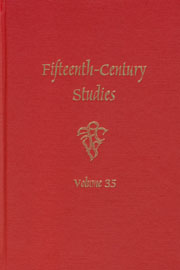Book contents
- Frontmatter
- Contents
- Preface
- Essays
- 1 Violencia en tres cuentos hagiográficos de la España medieval
- Physical Impairment in the First Surgical Handbooks Printed in Germany
- Serious Elements in Medieval French Farces: A New Dimension
- Narrative Afterlife and the Treatment of Time in Henryson's Testament of Cresseid
- Euclid in Boethius's De Consolatione Philosophiae and Some of its English Translations
- Seeking the Medieval in Shakespeare: The Order of the Garter and the Topos of Derisive Chivalry
- A Revelation of Purgatory and Chaucer's Prioress
- Eyeglasses for the Blind: Redundant Therapies in Meschinot and Villon
- Jean de Meun in the Cité des Dames: Author versus Authority
- The Festival Context of Villon's Pet au Deable: Martinmas in Late-Medieval Paris
Jean de Meun in the Cité des Dames: Author versus Authority
from Essays
Published online by Cambridge University Press: 12 September 2012
- Frontmatter
- Contents
- Preface
- Essays
- 1 Violencia en tres cuentos hagiográficos de la España medieval
- Physical Impairment in the First Surgical Handbooks Printed in Germany
- Serious Elements in Medieval French Farces: A New Dimension
- Narrative Afterlife and the Treatment of Time in Henryson's Testament of Cresseid
- Euclid in Boethius's De Consolatione Philosophiae and Some of its English Translations
- Seeking the Medieval in Shakespeare: The Order of the Garter and the Topos of Derisive Chivalry
- A Revelation of Purgatory and Chaucer's Prioress
- Eyeglasses for the Blind: Redundant Therapies in Meschinot and Villon
- Jean de Meun in the Cité des Dames: Author versus Authority
- The Festival Context of Villon's Pet au Deable: Martinmas in Late-Medieval Paris
Summary
The focus of this essay will be a sequence of three specific allusions to the Roman de la Rose found in Christine de Pizan's Cité des Dames, which have yet to be read in relation to one another. These references to the Rose constitute a potent example of Christine's use of Jean de Meun as a counterpoint for her own concepts of authority and truth, grounded in her experience as a woman. By comparing their respective contexts, and certain details present in or missing from each, we can trace across these nods toward the Rose an increasingly pointed challenge to Jean de Meun. The differences among the three allusions also reflect the modulation of Christine as protagonist within the text. As that persona she moves from being a confused and troubled reader for whom the supposed truth found in books destabilizes her own sense of personal authority, toward being an educated, emboldened woman having the wherewithal to speak on behalf of women and to offer counsel. The protagonist's evolution, in turn, is evocative of Christine de Pizan herself as an increasingly confident voice of authority in the real world.
Christine de Pizan (c.1364–1431), known as the first professional woman of letters in France, created a vast body of work ranging from lyric love poetry to prose treatises on warfare and judicious governing. With her Cité des Dames, written in 1404–05, she became the first woman to compose a formal defense of women, in which she systematically confronts and rewrites the predominantly misogynous discourse that had constituted literary authority for centuries.
- Type
- Chapter
- Information
- Fifteenth-Century Studies , pp. 132 - 142Publisher: Boydell & BrewerPrint publication year: 2009



